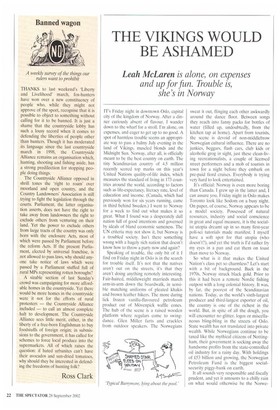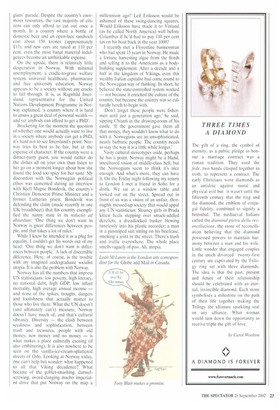THE VIKINGS WOULD BE ASHAMED
Leah McLaren is alone, on expenses
and up for fun. Trouble is, she's in Norway
IT's Friday night in downtown Oslo, capital city of the kingdom of Norway. After a dinner curiously absent of flavour, I wander down to the wharf for a stroll. I'm alone, on expenses, and eager to get up to no good. A spot of harmless trouble seems an appropriate way to pass a balmy July evening in the land of Vikings, muscled blonds and the Midnight Sun. Norway, after all, is officially meant to be the best country on earth. The tiny Scandinavian country of 4.5 million recently scored top marks on this year's United Nations quality-of-life index, which measures the standard of living in 173 countries around the world, according to factors such as life-expectancy, literacy rate, level of education and income. (Canada, which had previously won for six years running, came in third behind Sweden.) I went to Norway for a week to find out what makes it so great. What I found was a desperately dull nation full of good intentions and governed by ideals of bland economic sameness. The UN criteria may not show it, but Norway is a troubled society. Isn't there something wrong with a hugely rich nation that doesn't know how to throw a party now and again?
Speaking of trouble, the only bit of it I find on Friday night in Oslo is in the search for trouble itself. It's not that the natives aren't out on the streets, it's that they aren't doing anything remotely interesting. Fair-haired, middleweight marrieds march arm-in-arm down the boardwalk, in sensible matching uniforms of pleated khakis and brown leather hikers. The more daring lick frozen vanilla-flavoured petroleum product out of Movenpick waffle cones. The hub of the scene is a raised wooden platform where regulars come to swingdance. Glen Miller farts and crackles from outdoor speakers. The Norwegians sweat it out, flinging each other awkwardly around the dance floor. Between songs they reach into fanny packs for bottles of water (filled up, undoubtedly, from the kitchen tap at home). Apart from tourists, the scene is devoid of non-middlebrow Norwegian cultural influence. There are no junkies, beggars, flash cars, club kids or alcoholic grog in sight, just these clean-living recreationalists, a couple of licensed street performers and a mob of tourists in town for a night before they embark on pre-paid fiord cruises. Everybody is trying very hard to look entertained.
It's official: Norway is even more boring than Canada. I grew up in the latter and, I can assure you, Friday night in Oslo makes Toronto look like Sodom on a busy night. On paper, of course, Norway appears to he a model society. Possessed of natural resources, industry and social conscience in great and equal measure, it is the socialist utopia dreamt up in so many first-year poli-sci tutorials made manifest. I myself have a soft spot for that utopia (who doesn't?), and yet the truth is I'd rather fry my eyes in a pan and eat them on toast than move to Norway.
So what is it that makes the United Nation's class pet so charmless? Let's start with a bit of background. Back in the 1970s, Norway struck black gold. Prior to this it had been a remote Nordic fishing outpost with a long colonial history. It was, by far, the poorest of the Scandinavian nations. Today, as the world's sixth-largest producer and third-largest exporter of oil, the country is one of the richest in the world. But, in spite of all the dough, you will encounter no glitter, logos or miscellaneous bling-bling in the streets of Oslo. State wealth has not translated into private wealth. While Norwegians continue to be taxed like the mythical citizens of Nottingham, their government is socking away the handsome profits from the state-controlled oil industry for a rainy day. With holdings of /53 billion and growing, the Norwegian Petroleum Fund is the biggest socialsecurity piggy-bank on earth.
It all sounds very responsible and fiscally prudent, and yet it amounts to a chilly rain on what would otherwise be the Nome gians. parade. Despite the country's enormous resources, the vast majority of citizens can only afford to eat out once a month. In a country where a bottle of domestic beer and an open-face sandwich cost about 150 kroner (approximately f13), and new cars are taxed at 110 per cent. even the most banal material indulgences become an unthinkable expense.
On the upside, there is relatively little desperation in Norway. With minimal unemployment, a cradle-to-grave welfare system. universal healthcare, pharmacare and free university education, Norway appears to be a society without any cracks to fall through. It is, as Ragnhild Imerslund, representative for the United Nations Development Programme in Norway explained, 'a country where it is hard to amass a great deal of personal wealth — and yet anybody can afford to get a PhD'.
Bracketing for the moment the question of whether one would actually want to live in a society where anybody can get a PhD, it's hard not to see Imerslund's point. Norway tries its best to be fair, but at the expense of character. If the country were a dinner-party guest, you would rather do the dishes all on your own than listen to her go on a moment longer about how she found the food too spicy for her taste. My discomfort with the Norwegian political ethos was cemented during an interview with Kjell Magne Bondevik, the country's Christian Democrat Prime Minister and a former Lutheran priest. Bondevik was defending the claim (made recently in one UK broadsheet) that his country exemplified the nanny state in its reductio ad absurdum: 'One thing we don't want in Norway is great differences between people, and that takes a lot of rules.'
While I knew he intended it as a plug for equality, I couldn't get his words out of my head: 'One thing we don't want is differences between people.' A lack of discernible difference. Here, of course, is the trouble with my imagined undergraduate socialist utopia. It is also the problem with Norway.
Norway has all the numbers that impress UN statisticians: low poverty, high literacy, no national debt, high GDP, low infant mortality, high average annual income — and none of the spikes, troughs, dangers and foolishness that actually matter to those who live there. What the UN doesn't (and ultimately can't) measure, Norway doesn't have much of, and that's cultural vibrancy. Diversity — the clash between seediness and sophistication, between trash and treasures, people with old money, new money and no money — is what makes a place culturally exciting (if also embittering). It is also nowhere to be seen on the vanilla-ice-cream-splattered streets of Oslo, Looking at Norway today, one can't help but wonder: what happened to all that Viking decadence? What became of the goblet-smashing, damselscrewing, sword-clanging macho imperialist drive that put Norway on the map a millennium ago? Leif Eriksson would be ashamed of these swing-dancing squares. Would Eriksson have made it to Vinland (as he called North America) well before Columbus if he'd had to pay 110 per cent tax on his boat back in the year 1000?
I recently met a Florentine businessman who had spent 15 years in Norway. He made a fortune harvesting algae from the fiords and selling it to the Americans as a bodybuilding supplement. After a decade and a half in the kingdom of Vikings, even this wealthy Italian capitalist had come round to the Norwegian way of thinking. In short, he believed the state-controlled system worked — not because it enriched the culture of the country, but because the country was so culturally bereft to begin with.
`Don't forget these people were fishermen until just a generation ago,' he said, sipping Chianti in the drawing-room of his castle. If the government gave them all that money, they wouldn't know what to do with it. Norwegians are an unsophisticated, nearly barbaric people. The country needs to stay the way it is a little while longer.'
Nasty cultural stereotypes aside, perhaps he has a point. Norway might be a bland, uncultured vision of middle-class hell, but the Norwegians seem to think it's nice enough. And what's more, they can have it. On the Friday night following my return to London I met a friend in Soho for a drink. We sat at a window table and looked out on the street. Spread out in front of us was a vision of an unfair, thoroughly messed-up society that would appal any UN statistician: Sloaney girls in Prada kitten heels stepping over smack-addled derelicts; a dreadlocked busker blowing tunelessly into his plastic recorder; a man in a pinstriped suit sitting on his briefcase, smoking a joint in the street. There's trash and traffic everywhere. The whole place smells vaguely of piss. Ah, utopia.
Leah McLaren is the London arts correspondent for the Globe and Mail in Canada.



































































































 Previous page
Previous page